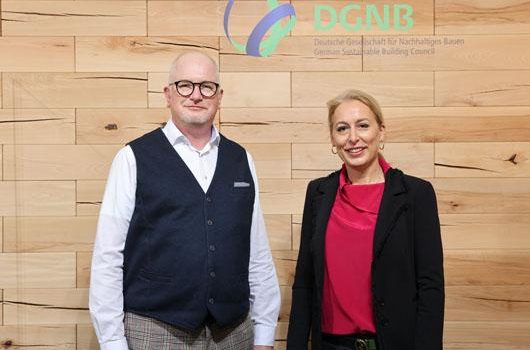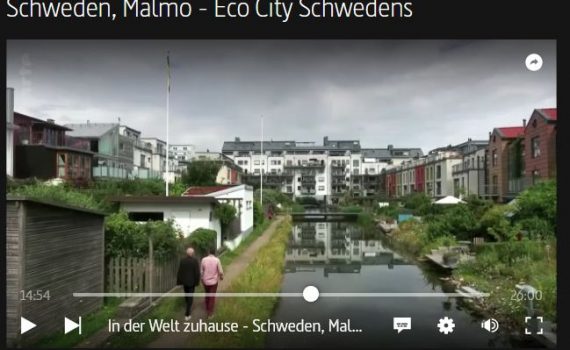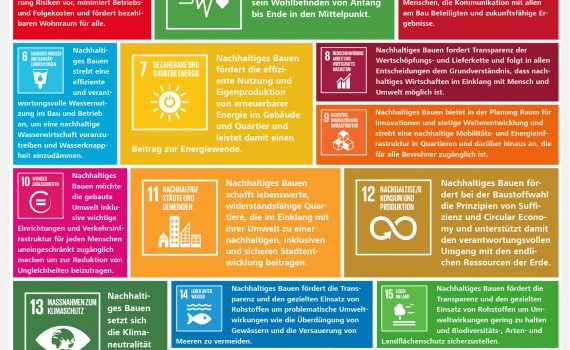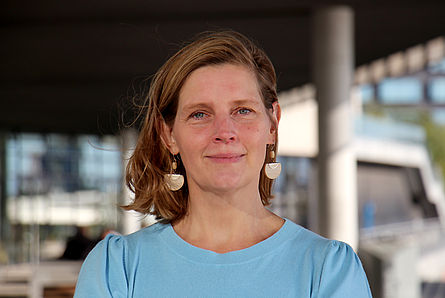Kategorie für Blog: Awards
The nominees for the German Building Award 2022 have been determined. A total of 29 housing projects were selected in a two-stage process by an interdisciplinary jury chaired by Susanne Wartzeck, President of the Association of German Architects BDA. This year, 187 housing projects completed between 2018 and 2021 took part in the competition across Germany.
[caption id="attachment_28516" align="alignleft" width="560"] Award-winning project "Stadt Landschaft Burg" of the Federal Prize 2020 - © Bundespreis Stadtgrün / Hergen Schimpf[/caption]
The Federal Ministry of Housing, Urban Development and Building today announced the Federal Urban Green Award 2022. This year, the focus is on the topic of "Climate adaptation and quality of life".
Federal Minister Klara Geywitz: "Climate change is a stress test for our cities. We need more trees for a better urban climate, we need soils that can absorb heavy rainfall, we need less sealed surfaces for more biodiversity and to prevent residential neighbourhoods from heating up. With the Federal Urban Green Award 2022, we are honouring the pioneering work that is already shaping the necessary transformation of cities."
Award-winning project "Stadt Landschaft Burg" of the Federal Prize 2020 - © Bundespreis Stadtgrün / Hergen Schimpf[/caption]
The Federal Ministry of Housing, Urban Development and Building today announced the Federal Urban Green Award 2022. This year, the focus is on the topic of "Climate adaptation and quality of life".
Federal Minister Klara Geywitz: "Climate change is a stress test for our cities. We need more trees for a better urban climate, we need soils that can absorb heavy rainfall, we need less sealed surfaces for more biodiversity and to prevent residential neighbourhoods from heating up. With the Federal Urban Green Award 2022, we are honouring the pioneering work that is already shaping the necessary transformation of cities."
Housing industry, architects and municipalities called upon to participate
 Berlin - Affordable and high-quality residential construction is currently more important than ever. For more than three decades, outstanding residential construction projects have been honoured every two years with the German Builder-Owner Award. This year's edition of the competition has now been announced.
The aim of the award, which is sponsored by the Federal Ministry of Housing, Urban Development and Building, is to recognise the responsible efforts of developers to create affordable housing and neighbourhoods of "high quality at affordable costs".
Berlin - Affordable and high-quality residential construction is currently more important than ever. For more than three decades, outstanding residential construction projects have been honoured every two years with the German Builder-Owner Award. This year's edition of the competition has now been announced.
The aim of the award, which is sponsored by the Federal Ministry of Housing, Urban Development and Building, is to recognise the responsible efforts of developers to create affordable housing and neighbourhoods of "high quality at affordable costs".
 "nWert", GLS Gemeinschaftsbank eG's sustainability rating tool for real estate, has been recognised by the German Sustainable Building Council (DGNB) as a sustainability rating. At the same time, GLS Bank recognises the DGNB certificate as proof when granting financing. This was announced by Dr. Christine Lemaitre of the DGNB and Dr. Matthias Morgenstern, GLS ImmoWert, on the occasion of Expo Real 2021 in Munich.
"nWert", GLS Gemeinschaftsbank eG's sustainability rating tool for real estate, has been recognised by the German Sustainable Building Council (DGNB) as a sustainability rating. At the same time, GLS Bank recognises the DGNB certificate as proof when granting financing. This was announced by Dr. Christine Lemaitre of the DGNB and Dr. Matthias Morgenstern, GLS ImmoWert, on the occasion of Expo Real 2021 in Munich.
This building group project with 43 residential units, some of them as maisonettes, was realized as a timber hybrid building and exemplifies the qualities of timber construction in a dense urban context.
The Special price on the topic "Urban development revisited: Prices - Practice - Perspectives" was given to the project Urban development area Stuttgarter Straße, French Quarter in Tübingen. The special prize, which is awarded in parallel to the urban development prize, serves to highlight particularly urgent fields of action in urban development and urban planning. It was awarded on 23.4.2021 on the occasion of the 40th anniversary of the German Urban Development Prize to contributions that had already been recognised with prizes and awards between 1980 and 2010. The judging of the special prize was very complex, as it had to cover a span of 30 years, i.e. a generation, of the achievements of German urban development that were considered outstanding at the time, and, in retrospect, it had to be based on robust, objective criteria that could adequately reflect the complexity of 30 years of urban development history and 30 years of urban development models.
 The prize is awarded every two years by the German Academy for Urban Development and Regional Planning (DASL) with significant support from the Wüstenrot Foundation. Urban Development Award in the DSP 2020 competition goes to the project Quarter at the former Blumengroßmark in Berlin. With 81 applications, a particularly large number of projects were submitted for the Urban Design Award. The spectrum was very broad: urban-structural-geographical, thematic, structural-spatial. From the new town hall in the urban planning context of a small municipality to the large conversion project of a metropolitan region, the interdisciplinary jury (urban planning, architecture, open space planning, preservation of historical monuments, economics, sociology) was faced with a very difficult decision in many cases.
The prize is awarded every two years by the German Academy for Urban Development and Regional Planning (DASL) with significant support from the Wüstenrot Foundation. Urban Development Award in the DSP 2020 competition goes to the project Quarter at the former Blumengroßmark in Berlin. With 81 applications, a particularly large number of projects were submitted for the Urban Design Award. The spectrum was very broad: urban-structural-geographical, thematic, structural-spatial. From the new town hall in the urban planning context of a small municipality to the large conversion project of a metropolitan region, the interdisciplinary jury (urban planning, architecture, open space planning, preservation of historical monuments, economics, sociology) was faced with a very difficult decision in many cases.
 The Federal Award ENVIRONMENT & BUILDING initiated by the Federal Ministry for the Environment, Nature Conservation and Nuclear Safety (BMU) and the Federal Environment Agency (UBA) under the patronage of Federal Minister Svenja Schulze honors projects that already realize the idea of a new Bauhaus in the sense of holistically sustainable buildings. In 2021, the prize will be awarded for the second time, this time in four categories. All players in the building sector are eligible to apply. The closing date for entries is 25 May 2021.. The prize will be awarded on 7 September by Parliamentary State Secretary Florian Pronold and UBA President Dirk Messner.
The Federal Award ENVIRONMENT & BUILDING initiated by the Federal Ministry for the Environment, Nature Conservation and Nuclear Safety (BMU) and the Federal Environment Agency (UBA) under the patronage of Federal Minister Svenja Schulze honors projects that already realize the idea of a new Bauhaus in the sense of holistically sustainable buildings. In 2021, the prize will be awarded for the second time, this time in four categories. All players in the building sector are eligible to apply. The closing date for entries is 25 May 2021.. The prize will be awarded on 7 September by Parliamentary State Secretary Florian Pronold and UBA President Dirk Messner.
 "New large-scale construction projects and ecological innovations have ensured that Malmö is now a prime example of the direct transition from an industrial metropolis to a sustainable eco city. The secret recipe: the city not only relied on innovative technologies, but above all on the active participation of citizens in the transformation."
"New large-scale construction projects and ecological innovations have ensured that Malmö is now a prime example of the direct transition from an industrial metropolis to a sustainable eco city. The secret recipe: the city not only relied on innovative technologies, but above all on the active participation of citizens in the transformation."
A new study from Denmark takes a look at the costs of sustainable building construction and shows that more sustainable does not automatically mean more expensive. On the contrary. The study by Buus Consult on behalf of the DGNB system partner from Denmark, the Green Building Council Denmark, now provides clarity. In the study, it takes a close look at 37 DGNB-certified buildings.
Deadline extension! Instead of 31.12.2020 the project submission ends up to and including Friday, 22.01.2021.
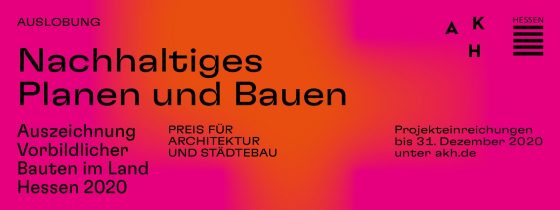 Prize for architecture and urban development
The State of Hesse, represented by the Hessian Ministry of Finance and the Chamber of Architects and Town Planners of Hesse jointly offer the award under a specific theme every three years. The theme for 2020 is "Sustainability".
The competition is looking for innovative projects and plans in the field of sustainable planning and construction that have been realised or are currently being realised in Hessen in the last five years.
Prize for architecture and urban development
The State of Hesse, represented by the Hessian Ministry of Finance and the Chamber of Architects and Town Planners of Hesse jointly offer the award under a specific theme every three years. The theme for 2020 is "Sustainability".
The competition is looking for innovative projects and plans in the field of sustainable planning and construction that have been realised or are currently being realised in Hessen in the last five years.
 The German Sustainable Building Council (DGNB e.V.) has published a new report explaining how buildings can contribute to the United Nations' global sustainability goals. The publication compares the 17 Sustainable Development Goals (SDGs) with the potential influence of sustainable planning and construction. Architects and planners, as well as building owners and municipalities, are thus provided with orientation as to how they can meaningfully become active in terms of sustainable development. The report also offers a comparison of the SDGs with the criteria of various DGNB certification systems. This shows: Up to 15 of the 17 SDGs are addressed in the context of the DGNB certification of a building project.
The German Sustainable Building Council (DGNB e.V.) has published a new report explaining how buildings can contribute to the United Nations' global sustainability goals. The publication compares the 17 Sustainable Development Goals (SDGs) with the potential influence of sustainable planning and construction. Architects and planners, as well as building owners and municipalities, are thus provided with orientation as to how they can meaningfully become active in terms of sustainable development. The report also offers a comparison of the SDGs with the criteria of various DGNB certification systems. This shows: Up to 15 of the 17 SDGs are addressed in the context of the DGNB certification of a building project.
 Dr. Kirsten David, a researcher at HafenCity University (HCU) Hamburg, has developed an innovative method for determining rent increases after energy efficiency measures: By means of functional cost splitting, rent increases become appropriate and comprehensible. The planning of the energetic measures is also ecologically optimized. For her dissertation entitled "Functional Cost Splitting for the Determination of Rent Increases after Energy Efficiency Measures", the scientist today receives the "BUND Research Award 2020". With the research award, the Bund für Umwelt- und Naturschutz (BUND) honors scientific work on sustainable development.
Dr. Kirsten David, a researcher at HafenCity University (HCU) Hamburg, has developed an innovative method for determining rent increases after energy efficiency measures: By means of functional cost splitting, rent increases become appropriate and comprehensible. The planning of the energetic measures is also ecologically optimized. For her dissertation entitled "Functional Cost Splitting for the Determination of Rent Increases after Energy Efficiency Measures", the scientist today receives the "BUND Research Award 2020". With the research award, the Bund für Umwelt- und Naturschutz (BUND) honors scientific work on sustainable development.
Jury statement: "The WIR neighbourhood in Berlin is characterised not only by its high energy efficiency (KfW 40 standard) and the use of wood as a renewable raw material for the building construction, but also by the collaborative planning process, which led to different housing concepts and the integration of different social communities. Communal areas and shared facilities such as a residents' workshop, swimming pool, neighbourhood square and daycare centre enable a lively and diverse neighbourhood. This also includes a dementia residential community as well as organisations for youth work and refugee groups. The five apartment blocks were realised with a timber frame construction and the façade in timber panel construction. This resulted in flexible floor plans that offer good conversion options."
 With the architect Amandus Samsøe Sattler, the German Sustainable Building Council - DGNB e.V. has a new president. In this role, he succeeds Prof. Alexander Rudolphi, who will continue his work on the association's executive committee. The change was announced today during the DGNB Sustainability Day in Stuttgart. The election was held on the eve of the event by the ten members of the DGNB Executive Committee. Samsøe Sattler will initially take over the office until the next DGNB general meeting in the middle of next year.
With the architect Amandus Samsøe Sattler, the German Sustainable Building Council - DGNB e.V. has a new president. In this role, he succeeds Prof. Alexander Rudolphi, who will continue his work on the association's executive committee. The change was announced today during the DGNB Sustainability Day in Stuttgart. The election was held on the eve of the event by the ten members of the DGNB Executive Committee. Samsøe Sattler will initially take over the office until the next DGNB general meeting in the middle of next year.
Short video about the DGNB system for districts in the 2020 version. Which criteria are relevant? Which types of neighbourhoods can be certified according to DGNB?
The Lower Saxony Timber Construction Prize has now been awarded for the third time. The aim of the state-wide competition is to strengthen the use of wood as a climate-friendly and sustainable building material, to present the current state of timber construction and to inspire future builders to build with this unique raw material. The Lower Saxony Timber Construction Award 2020 honours structures and buildings that are predominantly made of wood and wood-based materials and stand out for their high design and timber construction quality, as well as taking particular account of ecological and resource-saving aspects in the interests of sustainability.
 21.01.2020 Everyone is talking about sustainability - including the construction industry. A prize that the Federal Ministry for the Environment, Nature Conservation and Nuclear Safety (BMU) and the Federal Environment Agency (UBA) have been offering since today provides the appropriate topic for discussion: With the new "Federal Award for Environment and Building", which will be awarded for the first time in 2020, the initiators want to distinguish projects with exemplary character in terms of sustainability - not only in the classic areas of existing buildings and new buildings, but also in five other categories. All players in the building sector can apply. The deadline for entries is 15 April 2020.
21.01.2020 Everyone is talking about sustainability - including the construction industry. A prize that the Federal Ministry for the Environment, Nature Conservation and Nuclear Safety (BMU) and the Federal Environment Agency (UBA) have been offering since today provides the appropriate topic for discussion: With the new "Federal Award for Environment and Building", which will be awarded for the first time in 2020, the initiators want to distinguish projects with exemplary character in terms of sustainability - not only in the classic areas of existing buildings and new buildings, but also in five other categories. All players in the building sector can apply. The deadline for entries is 15 April 2020.
 ROBIN WOOD has scrutinized the green electricity offers of 1,200 providers and publishes the results today in the "ROBIN WOOD Eco-Electricity Report 2020.". The environmental organization rates eight offers as recommendable. The current research report was realized with the support of the Open Knowledge Foundation Germany.
ROBIN WOOD has scrutinized the green electricity offers of 1,200 providers and publishes the results today in the "ROBIN WOOD Eco-Electricity Report 2020.". The environmental organization rates eight offers as recommendable. The current research report was realized with the support of the Open Knowledge Foundation Germany.
Dynamic master plan for the Patrick Henry Village presented / Citizen participation from 9 December A central park with a lake in the centre, diversity in architecture and in the use of buildings, energy production directly in the neighbourhood, a ring road, large neighbourhood garages, the public space for it free of parking spaces - these are just a few aspects from [...]
(6:25 min.) published on 5.11.2019 The city of Eschweiler (North Rhine-Westphalia) has been awarded the "Climate Active Municipality 2019" climate protection prize by the Federal Ministry for the Environment in Category 1: "Resource and energy efficiency in the municipality". The city of Eschweiler is committed to more resource and climate protection with its Factor X construction areas. The prize is awarded by the Federal Ministry for the Environment (BMU) as part of the National Climate Initiative (NKI), which is implemented by the German Institute of Urban Affairs gGmbh (Difu).
The Timber Construction Award 2020 Building with Wood in Schleswig-Holstein and Hamburg honours realised buildings that are predominantly constructed from wood and wood-based materials as well as other renewable raw materials. The primary objective is to promote the use and further development of this resource-saving, environmentally friendly and sustainable building material. The buildings to be submitted should be of high design quality [...].
On Thursday, 19 September 2019, the Federal City of Bonn was awarded the label "StadtGrün naturnah". With this award, the alliance "Municipalities for Biodiversity" honors exemplary commitment on urban green spaces to promote biodiversity. Bonn was able to score points in the labeling process with species-rich wildflower meadows, sustainable forest management and innovative environmental education offers and now belongs to [...]
In the 2019 state competition, the focus is on existing buildings and inward growth: How are existing spaces optimally used in times of scarce building land? How can innovative living spaces be created by converting existing uses? The 2019 state competition is looking for exemplary examples - in the city and in the countryside - that take advantage of all the possibilities [...]
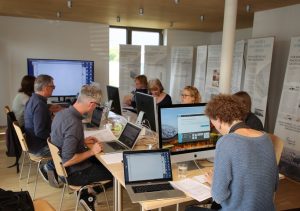 With funding from the federal funding programme "Unternehmen Revier", the Faktor X agency of the development company has developed an internet-based tool for easily calculating the resource efficiency of your own construction project. The tool has now undergone final testing and will be available online from September.
With funding from the federal funding programme "Unternehmen Revier", the Faktor X agency of the development company has developed an internet-based tool for easily calculating the resource efficiency of your own construction project. The tool has now undergone final testing and will be available online from September.
 Schleiden-Gemünd / Nettersheim, 05.04.2019. Experiencing the starry sky at night with twinkling celestial bodies is a special experience for many people that is now only possible in a few places in Germany - one of these places is the Eifel National Park. Since 2010, a regional initiative has been successfully campaigning for the protection of the night sky and the preservation of the natural night landscape - in 2014, this was followed by the provisional designation as the first "International Dark Sky Park" in Germany. Now this initiative can look forward to the final recognition as International Star Park Eifel National Park. The designation as a protected area of the International Dark Sky Association (IDA) is a predicate with which few regions worldwide can advertise themselves, in Germany there are only four. For the Eifel National Park, which turned 15 this year, this recognition is a nice "birthday present".
Schleiden-Gemünd / Nettersheim, 05.04.2019. Experiencing the starry sky at night with twinkling celestial bodies is a special experience for many people that is now only possible in a few places in Germany - one of these places is the Eifel National Park. Since 2010, a regional initiative has been successfully campaigning for the protection of the night sky and the preservation of the natural night landscape - in 2014, this was followed by the provisional designation as the first "International Dark Sky Park" in Germany. Now this initiative can look forward to the final recognition as International Star Park Eifel National Park. The designation as a protected area of the International Dark Sky Association (IDA) is a predicate with which few regions worldwide can advertise themselves, in Germany there are only four. For the Eifel National Park, which turned 15 this year, this recognition is a nice "birthday present".
Augsburg, 22.02.19: Together with partner company EXYTRON, Stadtwerke Augsburg (swa) has installed and commissioned the world's first decentralised power-to-gas plant in an existing residential complex. This enables a challenge of the energy transition to be mastered: surplus, regeneratively generated electricity is converted into synthetic natural gas and can thus be stored on site. Combustion then takes place in a commercially available combined heat and power plant and condensing boilers. In this way, over 180 residents in 70 apartments in the residential complex of the Augsburg housing group, which has existed since 1974, are supplied with climate-friendly electricity and heat.
| 2:33 min 12/17/2018 |
Yesterday, the Agency for Renewable Energies awarded the Rhine-Hunsrück district as Energy Municipality of the Decade / Environment and Energy Minister Ulrike Höfken congratulates warmly on this award. Yesterday, the Agency for Renewable Energies awarded the Rhine-Hunsrück district in Kassel as "Energy Municipality of the Decade". "Climate change is clearly noticeable in Rhineland-Palatinate, as currently [...]


